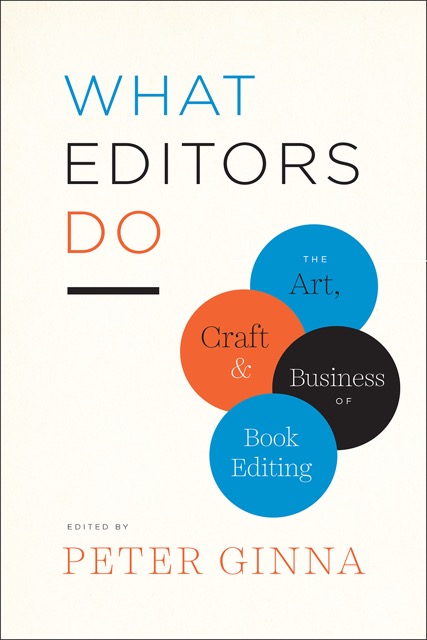What’s not to like about What Editors Do? This collection of essays traces the role of book editors from acquisition to publication and samples niches like editing genre fiction and working with self-publishing authors.
What’s more, the 27 contributors represent a “who’s who” of American publishing: Betsy Lerner, Carol Fisher Saller, Jonathan Karp, Scott Norton, Susan Rabiner, Michael Pietsch, Katharine O’Moore-Klopf, Jane Friedman … the list goes on. Between them, they exemplify the breadth and diversity of the industry.
The editor of this collection, Peter Ginna, has himself worked as a book editor and publisher in New York since 1982.
As Ginna explains in the introduction, What Editors Do is inspired by Gerald Gross’s Editors on Editing, an essay collection first published in 1962. At the time, and for decades after, Gross’s book was the only guide available that was written by editors for editors on their craft. What Editors Do updates this original concept for editors in the age of Amazon.
The book is organized into five parts: acquisitions, the publishing process from proposal to book, business aspects, editorial niches, and careers. The first three parts trace the phases of an in-house editor’s role in the journey of a book. Part IV considers the unique approaches to editing in different specialties: literary fiction, genre fiction, trade nonfiction, children’s and young adult books, biography and memoir, scholarly books, reference publishing, and illustrated books. In Part V, the in-house focus broadens to encompass a variety of publishing careers, including freelance editing and self-publishing.
A huge strength of this collection is the range of perspectives reflective of the industry itself. On one end of the spectrum we hear from Michael Pietsch, the CEO of Hachette Book Group, and on the other from Jeff Shotts, executive director of the independent literary publisher Graywolf Press.
Early in his career, Pietsch noticed that few editors kept their jobs into their 50s and 60s. Why? Because acquiring and working on manuscripts is not enough. Editors have to think like managers, he says, if they want to stick around. “Editors who have long careers are those who year after year bring in new books that make a profit for the house. Ultimately, it’s as simple and as hard as that.”
Shotts, on the other hand, believes that what the Big Five publishers have given up in becoming vast commercial enterprises is, quite simply, literature. This means that independent houses are “more necessary, and more alive” than ever. The profit motive, for Shotts, is far down on the list of criteria when it comes to acquiring books. What matters more is literary quality and social justice.
On the practical side, this collection offers an excellent overview of the stages of editing — developmental, stylistic and copy editing — and the author-editor relationship at each stage. The chapter on stylistic or line editing, by George Witte, shows how fluid those stages are, and that different kinds of line editing are required for different authors and genres.
My only quibble is that this collection is U.S.-centric. All the contributors are American. In the resources section at the back, Editors Canada and the U.K.’s Society for Editors and Proofreaders are not even mentioned.
That said, every editor should read this book. It’s a top-notch resource no matter what niche or stage of career an editor is in. I will read it again.
~~~
The Editors’ Weekly is the official blog of Editors Canada. Contact us.
Discover more from The Editors' Weekly
Subscribe to get the latest posts sent to your email.
